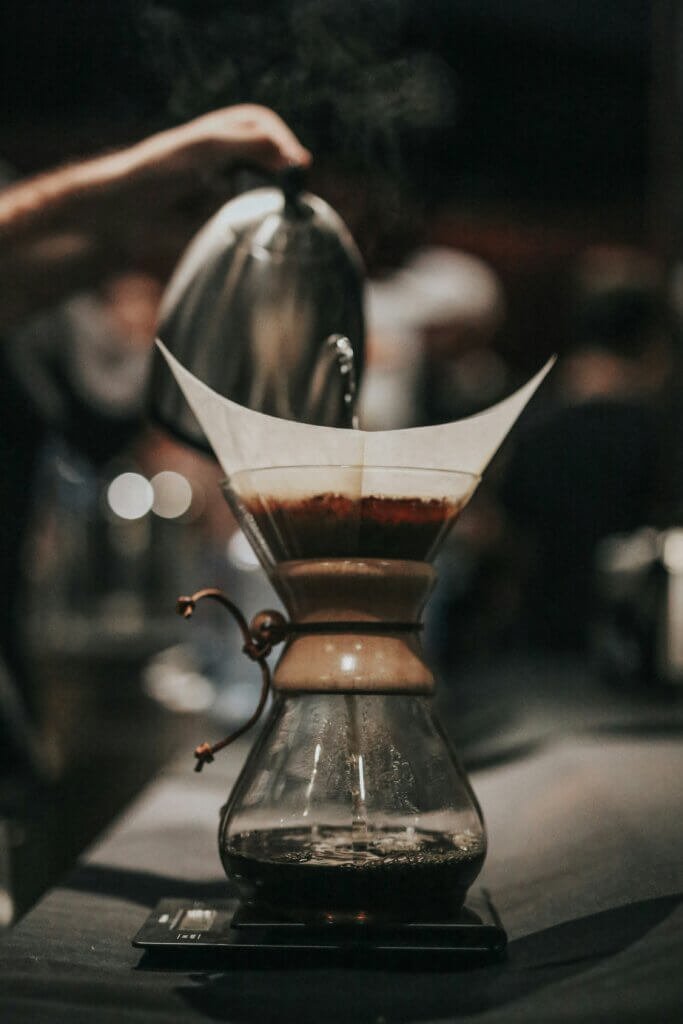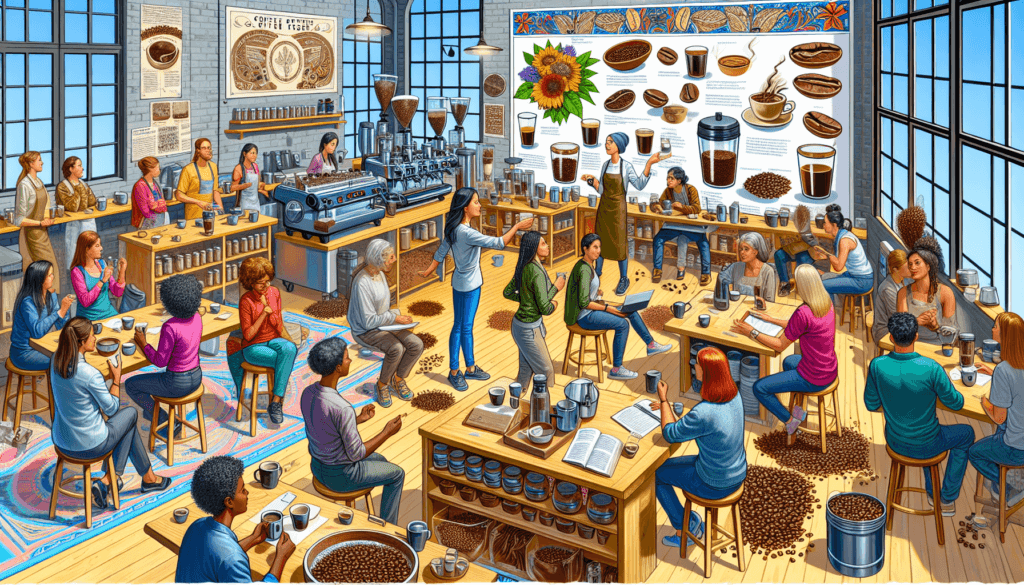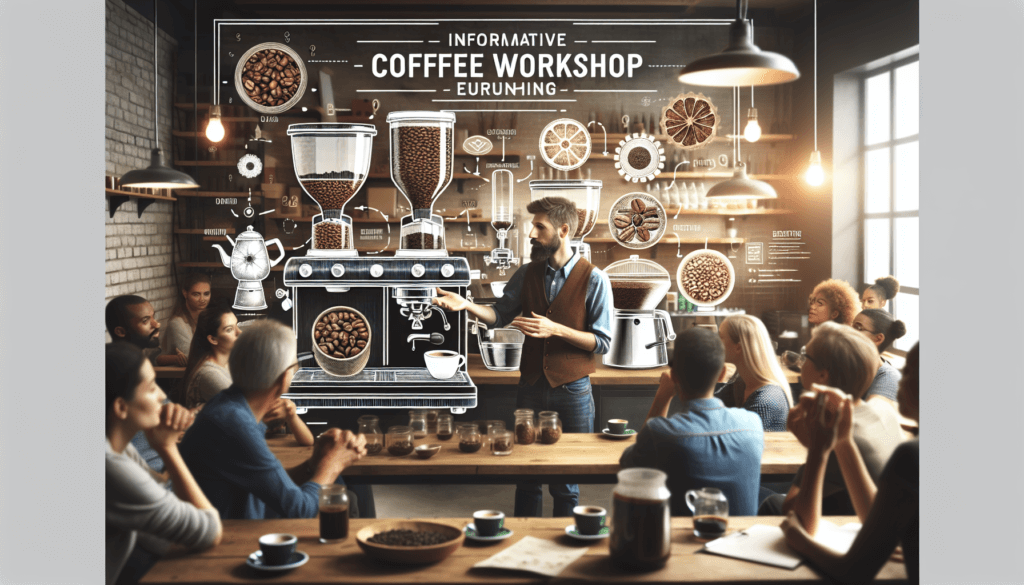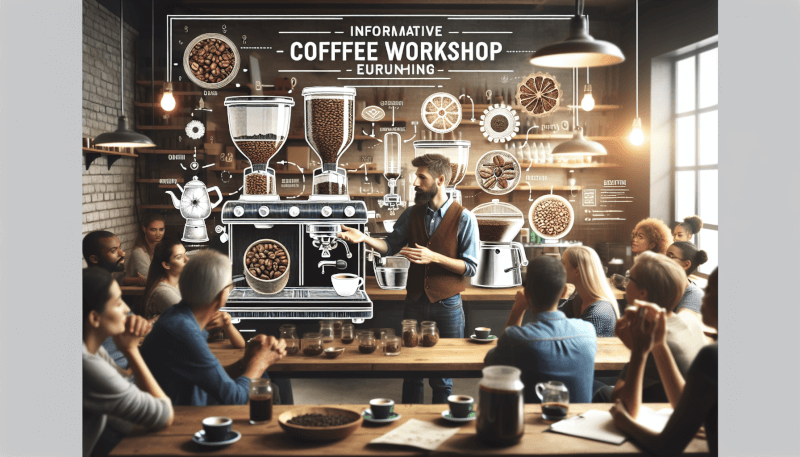If you’re looking for effective strategies to engage and educate your customers about the wonderful world of coffee, look no further. This article has got you covered. Whether you’re a coffee shop owner, a coffee enthusiast, or simply curious about how to create an enjoyable coffee experience for your customers, we’ve compiled a list of the best ways to captivate and educate your audience. From hosting coffee tasting events to offering educational resources, this article will provide you with the tools you need to create a memorable and educational experience for your customers. So grab your favorite cup of joe and get ready to discover the best ways to engage and educate your customers about coffee.

Importance of Customer Education
Understanding the Significance
Customer education is vital for the success of any business, including the coffee industry. When customers are educated about coffee, they become informed consumers who can make well-informed purchasing decisions. By providing customers with the knowledge and understanding of different coffee varieties, brewing techniques, and origins, you empower them to appreciate the fine nuances of coffee, thereby increasing their overall satisfaction with your products.
Moreover, customer education helps build trust and loyalty. When customers feel knowledgeable about the products they purchase, they are more likely to trust your brand and develop a long-term relationship with it. Educated customers also feel more confident in recommending your coffee to others, helping to expand your customer base through positive word-of-mouth.
Benefits of Customer Education
Engaging and educating your customers about coffee brings numerous benefits to your business. Firstly, it sets you apart from your competitors. When customers see that you prioritize customer education and go the extra mile to provide them with valuable information, they are more likely to choose your brand over others.
Secondly, customer education fosters customer satisfaction and loyalty. When customers understand the differences between various coffee varieties, their flavor profiles, and brewing techniques, they are more likely to find the coffee that best suits their preferences and enjoy it thoroughly. This increased satisfaction leads to customer retention, as they continue to choose your brand for their coffee needs.
Furthermore, customer education drives sales and revenue growth. Educated customers are more likely to make repeat purchases and explore different offerings from your brand. They may be willing to try new coffee flavors, brewing methods, and accessories, leading to increased sales and revenue for your business.
Targeting and Segmenting your Audience
Identifying your Target Audience
To effectively engage and educate your customers about coffee, it is crucial to identify your target audience. Your target audience will comprise individuals who are most likely to be interested in your coffee products and willing to learn more about them.
Start by understanding the demographics and preferences of your existing customer base. Consider factors such as age, gender, location, and lifestyle. Additionally, conduct market research to identify emerging trends and preferences in the coffee industry. This will help you tailor your educational efforts to specific groups and maximize their impact.
Segmenting your Audience
Once you have identified your target audience, segmenting them further can help you create personalized and targeted educational content. Segment your audience based on factors such as their level of coffee knowledge, preferred brewing methods, flavor preferences, or interest in specific coffee origins.
By segmenting your audience, you can develop tailored educational materials that address their specific needs and interests. This approach allows you to connect with your customers on a deeper level and provide them with information that is relevant and valuable to their individual coffee journey.
Creating a Knowledge Base
Building an Informative Website
An informative website serves as the foundation for educating your customers about coffee. Ensure that your website features detailed product descriptions, brewing guides, and information about coffee origins. Use clear, concise language to explain complex concepts and make the content easily understandable for all customers.
Consider incorporating visual aids such as infographics and videos to enhance the learning experience. These resources can demonstrate brewing techniques, showcase the unique characteristics of different coffee varieties, and provide a more engaging educational experience for your customers.
Developing a Blog for Coffee Education
A blog dedicated to coffee education can be a valuable resource for your customers. Create informative and engaging articles that cover various aspects of coffee, such as brewing tips, flavor profiles, and sustainable sourcing practices. Use the blog to share interesting coffee-related stories, industry updates, and expert opinions. Encourage customer interaction by allowing comments on the blog posts, fostering discussions, and addressing any queries or concerns raised by readers.
Creating an FAQ Section
An FAQ (Frequently Asked Questions) section on your website is an excellent way to address common customer queries and provide quick answers. Include questions related to brewing techniques, storage tips, or information about specific coffee origins. This section can save customers time by providing immediate solutions to their concerns, enhancing their overall experience with your brand.
Offering Tastings and Workshops
Organizing Coffee Tasting Events
Coffee tasting events are an effective way to engage and educate customers while providing them with a unique sensory experience. Host regular tasting events where customers can sample different coffee varieties and learn about their flavor profiles, acidity levels, and aroma notes. Encourage customers to ask questions, provide tasting notes and share their experiences. These events help customers develop a deeper appreciation for coffee and foster a sense of community around your brand.
Conducting Workshops on Brewing Techniques
Educate your customers on the art of brewing coffee through workshops. Cover various brewing methods, such as pour-over, French press, espresso, and cold brew. Teach customers the importance of grind size, water temperature, and brewing time to achieve optimal flavor extraction. Hands-on workshops allow customers to practice brewing techniques under expert guidance and gain valuable skills to elevate their coffee brewing at home.
Exploring Different Coffee Varieties
Introduce your customers to the world of coffee by organizing events that focus on exploring different coffee varieties. Provide information on the specific characteristics of each variety, such as Ethiopian, Colombian, or Brazilian coffee. Allow customers to taste and compare these different varieties side by side and discuss their preferences. These events broaden customers’ coffee knowledge and encourage them to try new and unique flavors.

Leveraging Social Media
Active Presence on Social Platforms
Interacting with your customers through social media platforms is an effective way to engage and educate them about coffee. Establish a strong presence on platforms like Instagram, Facebook, and Twitter by consistently posting content related to coffee education. Share interesting facts, brewing tips, and behind-the-scenes glimpses of your coffee production process. Regularly engage with your followers by responding to their comments, answering their questions, and acknowledging their feedback.
Sharing Educational Content
Use your social media platforms to share educational content in various formats, such as videos, infographics, and blog articles. Create visually appealing and informative content that highlights different aspects of coffee, including its origins, brewing techniques, and flavor profiles. This content should be easily digestible, entertaining, and shareable, encouraging your followers to spread the knowledge to their own networks.
Interacting with Customers in Coffee-related Discussions
Engage in coffee-related discussions with your customers on social media. Participate in conversations about popular coffee topics, answer questions, and provide expert advice. Actively seek out coffee-related hashtags and join relevant communities or groups to connect with coffee enthusiasts and create meaningful interactions. This approach allows you to position yourself as an authority in the coffee industry and build long-lasting relationships with your customers.
Providing Informative Packaging
Including Brewing Instructions on Coffee Packaging
Educate your customers about the optimal brewing methods for your coffee by including clear and concise instructions on the packaging. Specify the grind size, water-to-coffee ratio, and recommended brewing time. These instructions ensure that customers can enjoy your coffee to its fullest potential, enhancing their overall satisfaction and creating repeat customers.
Educational Labels on Coffee Bags
Take advantage of the space on your coffee bags to provide educational information. Add labels that highlight the unique flavor profiles and characteristics of the coffee inside. Include details about the coffee’s origin, processing methods, and any notable certifications. Educational labels not only inform customers but also demonstrate your brand’s commitment to transparency and sustainability.
Promoting Coffee Origins and Production Methods
Educate customers about the journey of coffee beans from the farm to their cup. Share information about the specific regions and farms where your coffee is sourced from. Highlight sustainable farming practices, fair trade certifications, or any other ethical considerations. By promoting transparency and sharing the stories behind your coffee, you provide customers with a deeper understanding and appreciation for the product they are consuming.

Collaborating with Influencers
Partnering with Coffee Experts and Influencers
Collaborating with coffee experts and influencers is an effective way to leverage their knowledge and reach a wider audience. Identify influencers who have a strong presence in the coffee industry and align with your brand values. Partner with them to create educational content, such as blog articles, videos, or social media posts. These collaborations not only provide valuable insights to your customers but also help increase brand awareness and credibility.
Creating Content with Experts
Invite coffee experts to contribute to your blog or website. Encourage them to share their expertise through guest blog posts, interviews, or educational videos. This collaborative approach allows you to tap into their knowledge and offer unique perspectives to your customers. By featuring industry experts, you position your brand as a reliable source of coffee education.
Hosting Joint Events and Collaborations
Organize joint events or collaborations with coffee experts and influencers. This could include hosting educational workshops, Q&A sessions, or even live coffee brewing demonstrations. By bringing together industry professionals and your customers, you create an immersive and engaging experience that facilitates learning and builds trust in your brand.
Engaging through Email Marketing
Creating a Coffee Newsletter
Establish a regular coffee newsletter that delivers educational content directly to your customers’ inboxes. Curate and share informative articles, recipes, or brewing tips. Keep customers updated on industry news, new coffee releases, and upcoming events. A coffee newsletter not only educates your customers but also allows you to stay connected with them and build a strong relationship.
Sending Informative Emails about Coffee
In addition to the newsletter, send targeted emails that focus on specific coffee topics or promotions. For example, send emails highlighting brewing techniques for a new coffee release or details about a limited-edition blend. These emails should provide educational value to your customers while also driving engagement and sales.
Offering Exclusive Promotions and Discounts
Use email marketing as a means to offer exclusive promotions and discounts to your customers. This not only shows appreciation for their loyalty but also incentivizes them to engage with your brand and make repeat purchases. Include educational content alongside the promotional offers to further educate your customers about the featured coffee products.

Encouraging Customer Feedback
Implementing Surveys and Feedback Forms
Implement surveys and feedback forms to gather insights and opinions from your customers. Ask them about their coffee preferences, their experience with your products, and their suggestions for improvement. This valuable feedback can help you identify areas for growth and tailor your educational efforts to better meet your customers’ needs.
Rewarding Customers for Providing Feedback
Encourage customers to provide feedback by offering incentives or rewards in exchange for their time and insights. This could be in the form of discounts, exclusive access to new products, or entry into a giveaway. By rewarding customers for their feedback, you foster a sense of loyalty and encourage continuous engagement.
Responding to Customer Feedback Promptly
When customers provide feedback, ensure prompt and personalized responses. Acknowledge their input, address any concerns raised, and thank them for their valuable contribution. This level of attentiveness demonstrates that you value their opinions and are committed to improving their overall experience with your brand.
Organizing Coffee Competitions and Events
Hosting Barista Competitions
Organize barista competitions to showcase the talent and skills of coffee professionals and engage your customers. These competitions provide an opportunity for customers to witness the artistry and precision behind coffee preparation. Offer tastings and educational sessions alongside the competitions to enhance the learning experience for both participants and spectators.
Organizing Coffee Festivals and Trade Shows
Organize coffee festivals and trade shows that bring together coffee enthusiasts, industry professionals, and your customers. Create an immersive environment that celebrates coffee culture, offering diverse experiences such as coffee tastings, live demonstrations, and educational seminars. These events provide a platform for customers to learn, engage, and deepen their connection with the world of coffee.
Involving Customers in Tasting Contests
Engage your customers by organizing tasting contests that allow them to showcase their palate and coffee knowledge. Create blind tastings where customers can try different coffee selections and identify specific flavors or origins. These contests promote active participation and provide an interactive educational experience for your customers.
In conclusion, engaging and educating your customers about coffee is crucial for the success of your business. By understanding the significance of customer education and implementing various strategies and tactics outlined in this article, you can build strong relationships with your customers, foster loyalty, and drive sales growth. Through targeted audience segmentation, the creation of informative content, leveraging social media, providing educational packaging, collaborating with influencers, engaging through email marketing, encouraging customer feedback, and organizing coffee competitions and events, you can create a comprehensive customer education program that elevates your brand and enriches the coffee experience for your customers. Remember, an educated customer is a satisfied customer that will keep coming back for more of your exceptional coffee offerings.



